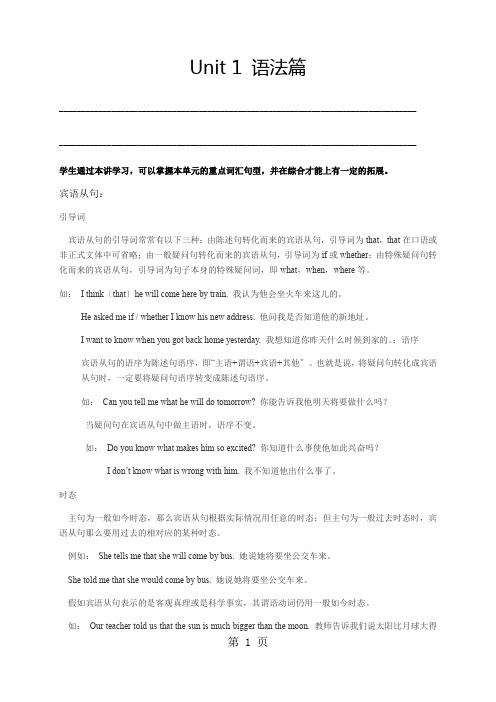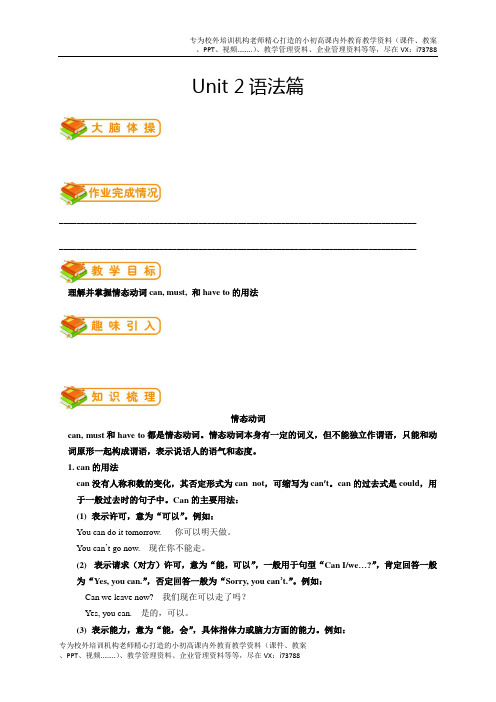北师大版初二(上)英语第2讲:unit 1语法篇(教师版)
- 格式:doc
- 大小:73.00 KB
- 文档页数:9

Unit 1 语法篇____________________________________________________________________________________________________________________________________________________________________学生通过本讲学习,可以掌握本单元的重点词汇句型,并在综合才能上有一定的拓展。
宾语从句:引导词宾语从句的引导词常常有以下三种:由陈述句转化而来的宾语从句,引导词为that,that在口语或非正式文体中可省略;由一般疑问句转化而来的宾语从句,引导词为if或whether;由特殊疑问句转化而来的宾语从句,引导词为句子本身的特殊疑问词,即what,when,where等。
如:I think〔that〕he will come here by train. 我认为他会坐火车来这儿的。
He asked me if / whether I know his new address. 他问我是否知道他的新地址。
I want to know when you got back home yesterday. 我想知道你昨天什么时候到家的。
:语序宾语从句的语序为陈述句语序,即“主语+谓语+宾语+其他〞。
也就是说,将疑问句转化成宾语从句时,一定要将疑问句语序转变成陈述句语序。
如:Can you tell me what he will do tomorrow? 你能告诉我他明天将要做什么吗?当疑问句在宾语从句中做主语时,语序不变。
如:Do you know what makes him so excited? 你知道什么事使他如此兴奋吗?I don’t know what is wrong with him. 我不知道他出什么事了。
时态主句为一般如今时态,那么宾语从句根据实际情况用任意的时态;但主句为一般过去时态时,宾语从句那么要用过去的相对应的某种时态。

北师大初二英语上册重点语法(一)一般将来时—般将来时表示将来某个时间要发生的动作或者存在的状态。
通常与表示将来的时间状语连用,如 tomorrow, the day after tomorrow, n ext year, n ext mon th, n ext week, in 100 years 等。
be going to do (动词原形)结构:表示打算、准备做的事情或者肯定要发生的事情。
如:It is going to rain.will do结构表示将来的用法:1. 表示预见Do you think it will rain?You will feel better after a good rest.2. 表示意图I will borrow a book from our school library tomorrow.What will she do tomorrow?基本构成如下:一般疑问句构成:(1)will+ 主语+do …? Will Sarah come to visit me nex t Sun day?(2)there be 结构的一般疑问句:Will there + be …?Will there be fewer trees? Yes, there will. / No, there won 't否定句构成:will + not (won't +doSarah won ' t come to visit me n ext Sun day.特殊疑问句构成:特殊疑问词+ will +主语+ …?What will Sarah do next Sunday?★★练一练★★根据例句,用will改写下列各句例: I don ' t feel well today. (be better tomorrow )I ' ll be better tomorrow.1. Gina has six classes today. (have a lot of homework toni ght )2. I ' m tired now.( sleep later)3. My parents need a new car. (buy one soon )4. We can ' t leave right now. (leave a little later )5. The weather is awful today. (be better tomorrow )(二)should 的用法:should用来提出建议和忠告,后边加动词原形,否定句直接在should后边加not.例如:I think you should eat less junk food.我认为你应该少吃垃圾食品。

Unit 1 语法篇____________________________________________________________________________________________________________________________________________________________________学生通过本讲学习,能够掌握本单元的重点词汇句型,并在综合能力上有一定的拓展。
宾语从句:引导词宾语从句的引导词常常有以下三种:由陈述句转化而来的宾语从句,引导词为that,that在口语或非正式文体中可省略;由一般疑问句转化而来的宾语从句,引导词为if或whether;由特殊疑问句转化而来的宾语从句,引导词为句子本身的特殊疑问词,即what,when,where等。
如:I think(that)he will come here by train. 我认为他会坐火车来这儿的。
He asked me if / whether I know his new address. 他问我是否知道他的新地址。
I want to know when you got back home yesterday. 我想知道你昨天什么时候到家的。
:语序宾语从句的语序为陈述句语序,即“主语+谓语+宾语+其他”。
也就是说,将疑问句转化成宾语从句时,一定要将疑问句语序转变成陈述句语序。
如:Can you tell me what he will do tomorrow? 你能告诉我他明天将要做什么吗?当疑问句在宾语从句中做主语时,语序不变。
如:Do you know what makes him so excited? 你知道什么事使他如此兴奋吗?I don’t know what is wrong with him. 我不知道他出什么事了。
时态主句为一般现在时态,则宾语从句根据实际情况用任意的时态;但主句为一般过去时态时,宾语从句则要用过去的相对应的某种时态。


Unit 2语法篇____________________________________________________________________________________________________________________________________________________________________理解并掌握情态动词can, must, 和have to的用法情态动词can, must和have to都是情态动词。
情态动词本身有一定的词义,但不能独立作谓语,只能和动词原形一起构成谓语,表示说话人的语气和态度。
1. can的用法can没有人称和数的变化,其否定形式为can not,可缩写为can’t。
can的过去式是could,用于一般过去时的句子中。
Can的主要用法:(1)表示许可,意为“可以”。
例如:You can do it tomorrow. 你可以明天做。
You can’t go now. 现在你不能走。
(2)表示请求(对方)许可,意为“能,可以”,一般用于句型“Can I/we…?”,肯定回答一般为“Yes, you can.”,否定回答一般为“Sorry, you can’t.”。
例如:---Can we leave now? 我们现在可以走了吗?---Yes, you can. 是的,可以。
(3)表示能力,意为“能,会”,具体指体力或脑力方面的能力。
例如:I can play basketball. 我会打篮球。
Can you sing well? 你唱歌唱得好吗?2. must和have to的用法must和have to都表示“必须”,其用法和区别如下:例如:We must study hard. 我们必须努力学习。
I had to borrow some money from my elder sister. 我不得不向姐姐借了一些钱。

Unit2 Making Plans语法一、be going to的表达方法。
(一)复习用现在进行时表示未来发生的事情e.g. 1. —Are you free on Sunday?—No, I’m visiting my friends.2. —What is he doing tomorrow?—He is playing baseball tomorrow.3. They’re having a party on Sunday.(二)be going to的表达方法be going to+动词原形1. 表示说话人根据现在已有的迹象,判断将要或即将发生某种情况。
这类句子的主语可以是人,也可是物。
例如:There is going to be a football match in our school tomorrow afternoon. 明天下午我们学校将有一场足球赛。
(已有告示)I feel terrible . I think I’m going to die. 我感到难受极了,我想我快不行了。
Look at t hose black clouds ! It’s going to rain. 看看那些乌云!天快要下雨了。
2. 表示主语现在的意图或现已作出的决定,即打算在最近或将来进行某事。
这种意图或决定往往是事先经过考虑的。
例如:He isn’t going to see his elder brother tomorrow. 他明天不准备去看他哥哥。
Mary is going to be a teacher when she grows up. 玛丽决定长大了当一名教师。
3. 只是单纯地预测未来的事,此时可与will互换。
例如:I think it is going to/will rain this evening. 我认为今晚要下雨。
注意:(1)be going to和will在含义和用法上略有不同。
Unit 1 语法篇____________________________________________________________________________________________________________________________________________________________________学生通过本讲学习,能够掌握本单元的重点词汇句型,并在综合能力上有一定的拓展。
宾语从句:引导词宾语从句的引导词常常有以下三种:由陈述句转化而来的宾语从句,引导词为that,that在口语或非正式文体中可省略;由一般疑问句转化而来的宾语从句,引导词为if或whether;由特殊疑问句转化而来的宾语从句,引导词为句子本身的特殊疑问词,即what,when,where等。
如:I think(that)he will come here by train. 我认为他会坐火车来这儿的。
He asked me if / whether I know his new address. 他问我是否知道他的新地址。
I want to know when you got back home yesterday. 我想知道你昨天什么时候到家的。
:语序宾语从句的语序为陈述句语序,即“主语+谓语+宾语+其他”。
也就是说,将疑问句转化成宾语从句时,一定要将疑问句语序转变成陈述句语序。
如:Can you tell me what he will do tomorrow? 你能告诉我他明天将要做什么吗?当疑问句在宾语从句中做主语时,语序不变。
如:Do you know what makes him so excited? 你知道什么事使他如此兴奋吗?I don’t know what is wrong with him. 我不知道他出什么事了。
时态主句为一般现在时态,则宾语从句根据实际情况用任意的时态;但主句为一般过去时态时,宾语从句则要用过去的相对应的某种时态。
第1页/共9页 Unit 1 语法篇 __________________________________________________________________________________ __________________________________________________________________________________ 学生通过本讲学习,能够掌握本单元的重点词汇句型,并在综合能力上有一定的拓展。 一般过去时表示:1 过去完成的动作 2. 过去反复或持续发生的状态和过去的习惯 感叹句一般是用来表示说话时的喜悦、惊讶等情感。英语感叹句常用"what"和"how"引导,"what"和"how"与所修饰的词置于句首,其它部分用陈述句语序。 一 由"what"引导的感叹句:"what"意为"多么"用作定语,修饰名词(被强调部分),单数可数名词前要加不定冠词a/an,复数可数名词或不可数名词前不用冠词。 这类句子的结构形式是: What + (a/an)+ adj.+ n.+主语+谓语+(it is). 如: ① What a clever girl she is! 多么聪明的姑娘呀! ② What an interesting story it is! 多么有趣的故事呀! ③ What good children they are! 他们是多么好的孩子呀! ④ What beautiful flowers they are! 多么漂亮的花呀! ⑤ What delicious food it is! 多么有味的食物呀! ⑥ What heavy snow it is! 多么大的雪呀! 二、由"how"引导的感叹句:"how"意为"多么",用作状语,修饰形容词或副词(被强调部分)。如果修饰形容词,则句中的谓语动词用系动词;如果how修饰副词,则句中的谓语动词用行为动词, 这类句子的结构形式是: How+adj.(adv.)+主语+谓语+(it is). 如:① How cold it is today! 今天多么冷呀! ② How nice the pictures are! 多么漂亮的图画呀! ③ How happy they look! 他们显得多么高兴呀! ④ How well she sings! 她唱得多好呀! ⑤ How hard they are working now! 他们干得多么起劲呀! 三、在表示同一意义时,英语感叹既可用"what"引导,也可用"how"引导。 如: ① What a hot day it is! How hot the day is ! 多么热的天气呀! ② What tall buildings they are! How tall the buildings are! 多么高的楼房呀! ③ What bad weather it is! How bad the weather is! 多么糟糕的天气呀! ④ What bright sunshine it is! How bright the sunshine is! 多么明亮的阳光呀! 四、感叹句在表示激动强烈的感情时,口语中常常采用省略句,其后面的主语和谓语往往略去不讲。 如:① What a fine day! 多么晴朗的天呀! ② What an honest boy! 多么诚实的孩子呀! 第2页/共9页
③ What red apples! 多么红的苹果呀! ④ How cool! 好凉快呀! ⑤ How wonderful! 精彩极了! 1. Who____________ the first prize in the spoken English match yesterday? A.win B.wined C.wining D.won 2. --- Your phone number again? I __________quite catch it. --- It's 9568442. A.didn't B.couldn't C.don't D.can't 3 _________role she played in the movie! That's why she has a lot of fans. A.How interesting B.How an interesting C.What interesting D.What an interesting 4 . --- ________ kind girl Jenny is! --- Yes. Everyone likes her very much. A.What B.What a C.How D.How a 5. When __________the accident __________? A.was; happen B.did; happen C.is; happen D.was; happened 解析:
1. 本题依据yesterday判断为过去时win的过去时为won故选D。 2. 本题根据题意可知为“刚才没有记下来”,因此为过去时可知答案为A。 3.依据感叹句结构:What + (a/an)+ adj.+ n.+主语+谓语+(it is). 故选D。 4.依据感叹句结构:How+adj.(adv.)+主语+谓语+(it is). 故选C。。 5.此题为过去时特殊疑问,助动词为did,故选B 基础演练
根据句意和首字母填写单词 1. What's the s_______ of the basketball match? 2. They asked the students about their free time activities and showed these r_______ to their teachers. 3. A reporter is going to i ______our headmaster. 4. Do you remember the e_______ of swimming? They'll let you think of your childhood. 5. Henry never does his homework as c______ as Ben. He always makes a lot of mistakes. 6. She didn't work hard, so she couldn't p______ the exam. 7. The weather here is t _______! It often snows heavily in winter. 8. It's a s________ for me not to help you. 9. I don't think I can b________ that record. 10. If you want to join our club, please fill in the f__________ . 答案:1 score 2 results 3 interview 4 experience 5 carefully
6 pass 7 terrible 8 shame 9 break 10 form 二、用单词正确形式填空
1. He worked very hard, and _______(earn) a lot of money. 2. It was _______ (move) to see how much strangers can care for each other 3. My friend_______ (agree) to go to the park with us yesterday. 4 The robbers ______ (hit) him over the head with a baseball bat. 第3页/共9页
5. Goodness me! Your ________ (pronounce) is very good. 6. The boy tried not to_______ (break) the glass, but he failed(失败). 7.Mr. Smith________ (lose) his wallet yesterday. So he went to the police for help. 8. Our English teacher often spends plenty of time ______(explain) questions to us. 9. Mr. Green will _________ (continue) studying in China. 10. Can you guess which team can ________ (win) the basketball match? 答案:1 earned 2 moving 3 agreed 4 hit 5 pronunciation
6 break 7 lost 8 explaining 9continue 10 win 巩固提高
1你能递我你脚下那个书包吗? Can you ______________ by your feet? 2. 他终于同意去昆明了。 He______________ Kunming at last. 3. 听他弹钢琴多开心啊! (用what) ____________ _it is to listen to him playing the piano! 4. 你的手好脏啊!快去洗! ________________ your hands are! Go and wash them now. 5 我头很疼。 I _________________ 6 你能解释一下比赛规则给我吗? Can you ______________ of the game to me, please? 7 如果你每天锻炼,你肯定健康。 You must _____________ if you do exercise every day. 8 这是一部感人的电影。 This is __________________. 9 他一生中领养了十二个聋儿。 He __________________ in his life. 10 这个队上半场进了3个球。 This team _____________ in the first half. 答案:1 pass the bag 2 agreed to go to 3 What a happy thing 4 How dirty 5 had a bad headache